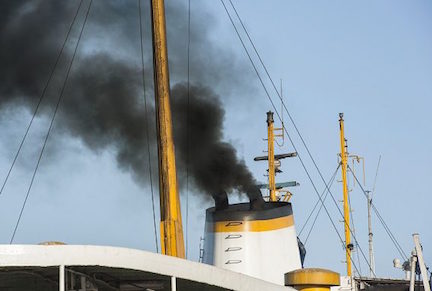The following is text of a news release from IHS Markit Safety at Sea:
(ENGLEWOOD, Colo.) — New aromatic-heavy fuel blends concocted to comply with the International Maritime Organization’s (IMO) 0.5 percent sulfur cap could increase black carbon in ship exhaust, exacerbating climate change, a new study has found.
The research, conducted in Germany and Finland in cooperation with DNV GL and engine builder MAN, suggests that black carbon – the term for carbon compounds laden with dark sooty particulates – is formed in marine engines in two circumstances particular to the sulfur cap: blended fuels high in aromatics benzene and toluene that are combusted at low engine loads. Where these conditions are met, black carbon emissions can increase up to 85 percent.
“If immediate action isn’t taken by the (IMO), the shipping industry’s use of low-sulfur shipping fuels (VLSFOs) – introduced to comply with the 2020 sulfur cap – will lead to a massive increase in black carbon emissions,” said Sian Prior, lead adviser to the Clean Arctic Alliance.
A major concern following the recent wildfires around the world, black carbon absorbs more light and heat energy from the sun than its fully combusted carbon dioxide (CO2) counterpart, leading to more drastic changes in the Earth’s albedo – the extent of light and heat reflected into space. A falling albedo is being taken for granted in the coming decades thanks to the retreating white surface of polar sea ice. But similar to the incomplete combustion of aromatics, incomplete combustion of carbon in trees during wildfires has caused large black carbon emissions, exacerbating climate change as well as respiratory illnesses.
Meanwhile, studies associated with this phenomenon have found particles of black carbon settled on ice sheets, diminishing their albedo even before they have melted. The Arctic Council has called for a 33 percent reduction of black carbon in the Arctic by 2025, and the IMO aims to ban fuel oil combustion in the Arctic entirely by 2021.
Prior said the IMO "must support an immediate switch to distillate fuels in the Arctic for all shipping and develop a global rule prohibiting fuels with high black carbon emissions.” In response, the IMO has scheduled a discussion on the issue during the week commencing Feb. 17.
It is not the first criticism leveled at the sulfur cap on environmental grounds; detractors have pointed out that the cap will push oil refineries to refine more crude in order to generate enough of the higher distillate fractions for blending, ultimately increasing the need for crude oil. Meanwhile, disallowing use of high-sulfur fuel oil (HSFO) in shipping will generate large surpluses of bunker fuel, which will likely come to displace cleaner fuels at power stations in the global south, where there is less international regulatory scrutiny. Those vessels equipped with scrubbers must burn additional fuel to operate them; meanwhile, incomplete combustion or any leakage whatsoever of the low-sulfur fuel liquefied natural gas (LNG) yields large volumes of atmospheric methane, a gas with between 2,500 and 3,000 percent of the global warming coefficient of CO2.

